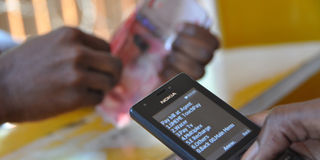Xente: An e-payment app offering cash-back

A customer makes a utility payment. Allan Rwakatungu, and his colleagues started building a system that allows transactions to occur in the digital economy. PHOTO BY ERONIE KAMUKAMA
What you need to know:
- Mr Allan Rwakatungu is the founder and chief executive officer of Xente Tech Ltd. Xente - a cashless application, is changing the way customers shop and save. It allows business people to make payments, get loans, book tickets, and shops anywhere in the world.
Businesses operating in the analog economy spend about 12 per cent of their revenue on managing cash. Such businesses prefer to transact in physical locations with cash.
Take for instance the time one wastes traveling to a financial institution, the money spent on transport in addition to the hours spent in queues.
But if you subscribe to digital innovations, time and money will be saved, businesses will become more competitive and productive; offering a certain level of convenience in return.
Going cashless
Xente is a cashless innovation or platform which is locally developed and can be used by people who have businesses to make payments, get loans, book tickets, and shops anywhere in the world.
In an interview with Prosper Magazine Mr Allan Rwakatungu, the founder and chief executive officer of Xente Tech Ltd, said the new application was built with the view to move businesses into the digital economy.
“Xente accepts your Visa debit card as well as MTN Mobile money and Airtel money as payment options. The app also offers Cash Back on every transaction a customer makes.”
Motivation
Rwakatungu wanted to start a business that sells products across the world. In other words, it works at roping in the informal sector into the formal financial system.
As a software developer during his daily route of creating websites for other people, it occurred to him that people will only end at one owing to the website.
“I quickly realised that if we can’t sell our products to the world, we are going to fall further behind. We want to allow our local businesses to have wider market and bigger markets globally.
Rwakatungu and his colleagues observed some two things; one that 99 per cent of people go to physical locations. Even when they go there, they use cash to pay. But that business model is very inefficient.
“It is very costly for both the business and the person who is doing the transaction in terms of how much time they need to spend doing it, how much money they need to do, if they have to go to the market physically,” he says.
That is how Rwakatungu and his colleagues started building a system that allows transactions to occur in the digital economy is more efficient and as well as add value to it by allowing people to get things like loans if they want to buy something, later on.
Market
Since February 2017, what Rwakatungu the thought was a dream came to fruition and Xente app operated by Xente Tech Ltd opened its doors to the market.
Although he is cagy to share how much the initial investment capital was sourced from the donors, the Xente app has since registered over 50,000 subscribers.
The company employs over 20 people directly and hundreds indirectly.
He says: “Our major functionality is to make payments for airtime, enable ticket bookings and allow people to get credit or loans when they purchase with the system.”
They recently partnered with Hima Cement, Plascon paints, Solar companies who get orders from customers using Xente and the materials delivered free of charge.
Rwakatungu says that because his dream was to have a service that can be used by many people in the world, they have since widened their footprint in markets like Nigeria.
In Nigeria, over 20,000 subscribers have signed up. Unfortunately, the response from the people was slow. As a result, they taken a few steps back.
However, the company is soon expanding to neighbouring Kenya, Tanzania and South Africa.
“We are trying to grow our market share and so the benefit will be the ability to build a sizeable company that would be valuable for our customers and shareholders,” he shared.
Challenges
Just like any other start-up, Xente has had its fair share of challenges in terms of convincing people to subscribe to something digital.
“We operate in a market where people find it hard to transition using cashless options. They would rather be present physically,” he says.
The other challenge is on the side of quality issues in the products itself so they have to work continuously to improve its quality so that it’s easy for people to use.
Forecasts
In the next five years, Rwakatungu wants to see Xente as a major player in the digital economy, helping many Ugandan businesses from big retailers and small retailers to event organisers that sell directly to customers.
“We see Xente powering a lot of transactions and we see ourselves offering lots of financial services on top of that so that not just payment but credit. We see ourselves as a bank with an online platform that has a lot of value to customers,” he says.




